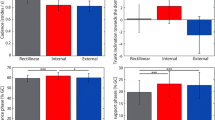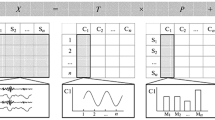Abstract
Despite a sixty-year tradition of research into “ideomotor reaction” it is not yet clear, whether myoelectric activity measured during mental training contains only inner-organismic or in addition task-specific information.
Our investigation involved one group trained actively in a sensorimotor task (paced contour-tracking), another group which was intermediately instructed to train on a mental level, and a third (control) group which had no instruction for training in the intermediate performances. Measurements were taken of the muscular activity (EMG) of the main working muscle (m. biceps) synchronously to the motion of the target in all three groups.
The data were submitted to several time series analysis procedures: auto-correlative measures and power spectra. Correlations were found between the filtered time series of the track and the EMG-activity in the mental training performances. The frequency distribution in the power spectra of the track was found in the power spectra of the active as well as in the mental training groups but not in those of the controls. The results indicate that the myoactivity during mental training clearly shows a task-specific frequency distribution.
Similar content being viewed by others
References
Allers, R., & Scheminsky, F. (1926). Über Aktionsströme der Muskeln bei motorischen Vorstellungen und verwandten Vorgängen. Pflügers Archiv für die gesamte Physiologie, 212, 169–182.
Dahlke, F., & Kruse, P. (1980). Ansätze zu einer Systemanalyse menschlicher Folgebewegungen. Diplomarbeit, Münster.
Gallistel, C.R. (1980). The organization of action: A new synthesis. Hillsdale, N.J.: Lawrence Erlbaum Associates.
Hacker, W. (1973). Allgemeine Arbeits- und Ingenieurpsychologie. Berlin (DDR): Deutscher Verlag der Wissenschaften.
Hacker, W., Volpert, W., & v. Cranach, M. (Eds.) (1982). Cognitive and Motivational Aspects of Action. Amsterdam: North Holland.
Higgins, J.R., & Angel, R.W. (1970). Correction of tracking errors without sensory feedback. Journal of Experimental Psychology, 84, 412–416.
Inman, V.T., Ralston, H.J., Saunders, J.B. de CM, Feinstein, B., & Wright, E.W. Jr. (1952). Relation of human electromyogram to muscular tension. EEG and Clinical Neurophysiology, 4, 187–194.
Jacobson, E. (1932). Electrophysiology of mental activities. American Journal of Physiology, 44, 677–694.
Karsli, A., & Vogt, S. (1981). Empirische Untersuchung zum mentalen Training sensomotorischer Fertigkeiten: Ideomotorische Reaktion, Strukturierung regulativen Wissens und spezifische Trainingswirksamkeit. Diplomarbeit, Münster.
Kelso, J.A., & Stelmach, G.E. (1976). Central and peripheral mechanisms in motor control. In: Stelmach, G.E. (Ed.): Motor control: Issues and trends. New York: Academic Press.
Kohl, R.M., & Roenker, D.L. (1980). Bilateral transfer as a function of mental imagery. Journal of Motor Behavior, 12, 197–206.
Kruse, P., Stadler, M., Vogt, S., & Wehner, T. (1983). Raum-zeitliche Integration wahrgenommener Bewegung durch Frequenzanalyse. Gestalt Theory, 5, 83–113.
Laurig, W. (1969). Analyse von Zeitreihen physiologischer Meßgrößen durch Korrelationsfunktion und Leistungsspektrum. Internationale Zeitschrift für angewandte Physiologie, 28, 9–22.
MacKay, D.G. (1981). The problem of rehearsal or mental practice. Journal of Motor Behavior, 13, 274–285.
MacKay, D.G. (1982). The problems of flexibility, fluency, and speed-accuracy trade-off in skilled behavior. Psychological Review, 89, 483–506.
McMahon, C.E. (1972). Role of covert neuromuscular activity in the kinesthetic hallucination. Unpublished Master's thesis, Pennsylvania State University.
Minas, S.C. (1978). Mental practice of a complex perceptual-motor skill. Journal of Human Movement Studies, 4, 102–107.
Pickenhain, L. (1976). Die Bedeutung innerer Rückkoppelungskreise für den Lernvorgang (gezeigt am Beispiel des motorischen Lernens). Zeitschrift für Psychologie, 184, 551–561.
Puni, A.Z. (1959). Bewegungsvorstellung und Training. In: Sport im Sozialismus — Beiträge zur Theorie der Körpererziehung. Berlin (DDR): Sportverlag.
Puni, A.Z., Zacharjanc, I.Z., & Surkov, E.N. (1961). Elektromyographische Untersuchungen von Bewegungsvorstellungen beim Erlernen von Turnübungen (russ). Voprosy Psikhologii, 4, 87–100.
Richardson, A. (1964). Has mental practice any relevance to physiotherapy? Physiotherapy, 50, 148–151.
Richardson, A. (1967). Mental practice: A review and discussion. Research Quarterly, 38, (I) 95–107, (II) 263–273.
Shaw, W.A. (1940). The relation of muscular action potentials to imaginal weightlifting. Archives of Psychology, 35, 5–40.
Stadler, M. (1981). Feldtheorie heute — von Wolfgang Köhler zu Karl Pribram. Gestalt Theory, 3, 185–199.
Start, K.B. (1973). Mentales Training. In: Grupe O (Ed.): Sport in unserer Welt — Chancen und Probleme. Berlin; Springer.
Steurer, B., & Schneiter, P. (1981). Über eine Methode zur Analyse der visuellen Informationsaufnahme beim Erlernen von psychomotorischen Tätigkeiten. In: Frei, F., & Ulich, Ed. (Eds.): Beiträge zur psychologischen Arbeitsanalyse. Bern: Huber.
Ulich, E. (1967). Some experiments on the function of mental training in the aquisition of motor skills. Ergonomics, 10, 411–419.
Ulich, E. (1974). Über verschiedene Formen des Trainings für das Erlernen und Wiedererlernen psychomotorischer Fertigkeiten. Rehabilitation, 13, 105–110.
Volpert, W. (1971). Sensumotorisches Lernen. Zur Theorie des Trainings in Industrie und Sport. Frankfurt/M: Limpert.
Wehner, T., & Stadler, M. (1982). Frequenzanalytische Untersuchungen zur kognitiven Steuerung von Mehrfachhandlungen durch Rhythmisierung. Zeitschrift für Psychologie, 190, 183–201.
Wehner, T., Stadler, M., Kruse, P., & Dahlke, F. (1982). Experimental studies on perceptive, mnestic, and operative anticipation in sensorimotor learning. Bremer Beiträge zur Psychologie, 14.
Author information
Authors and Affiliations
Rights and permissions
About this article
Cite this article
Wehner, T., Vogt, S. & Stadler, M. Task-specific EMG-characteristics during mental training. Psychol. Res 46, 389–401 (1984). https://doi.org/10.1007/BF00309071
Received:
Issue Date:
DOI: https://doi.org/10.1007/BF00309071




